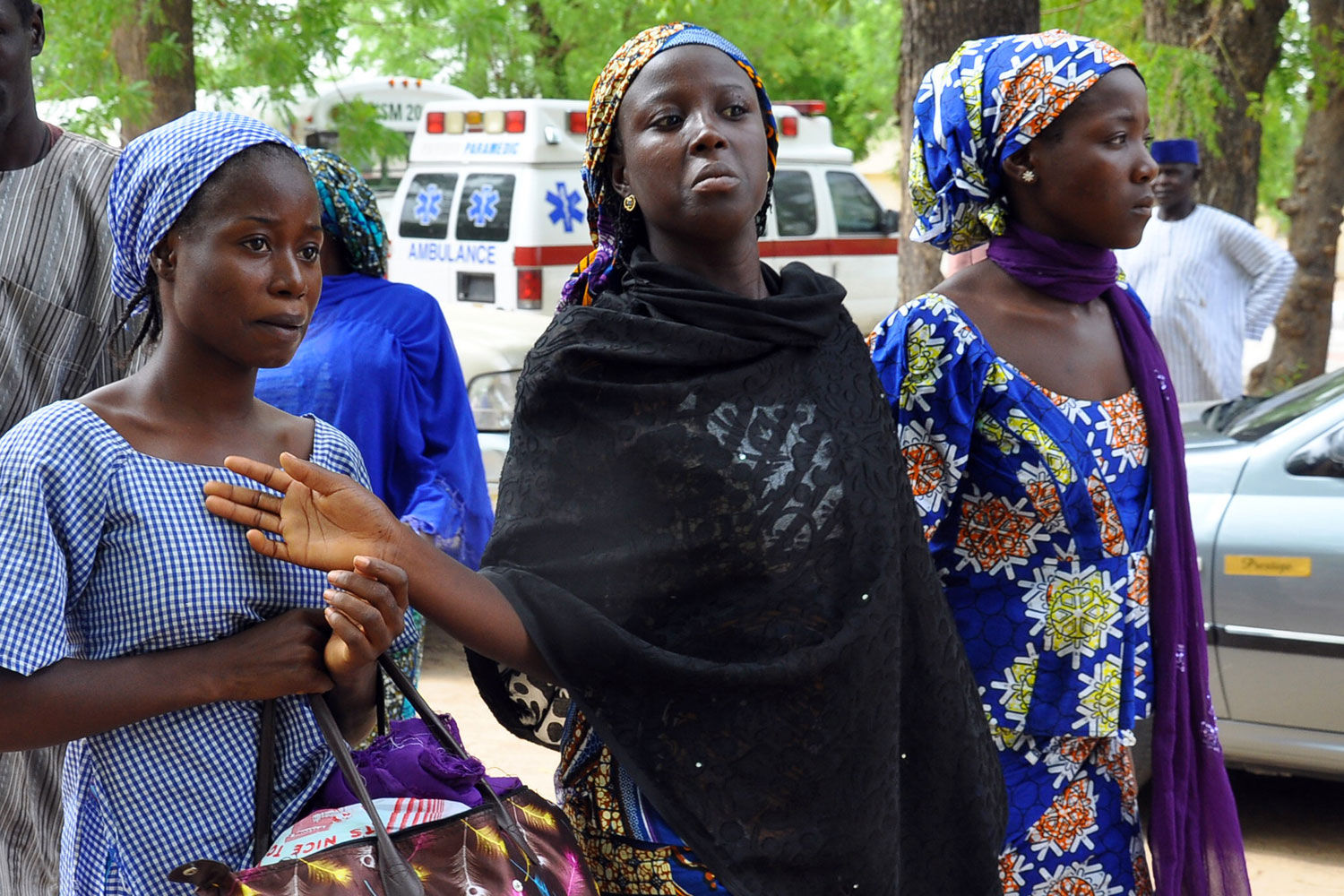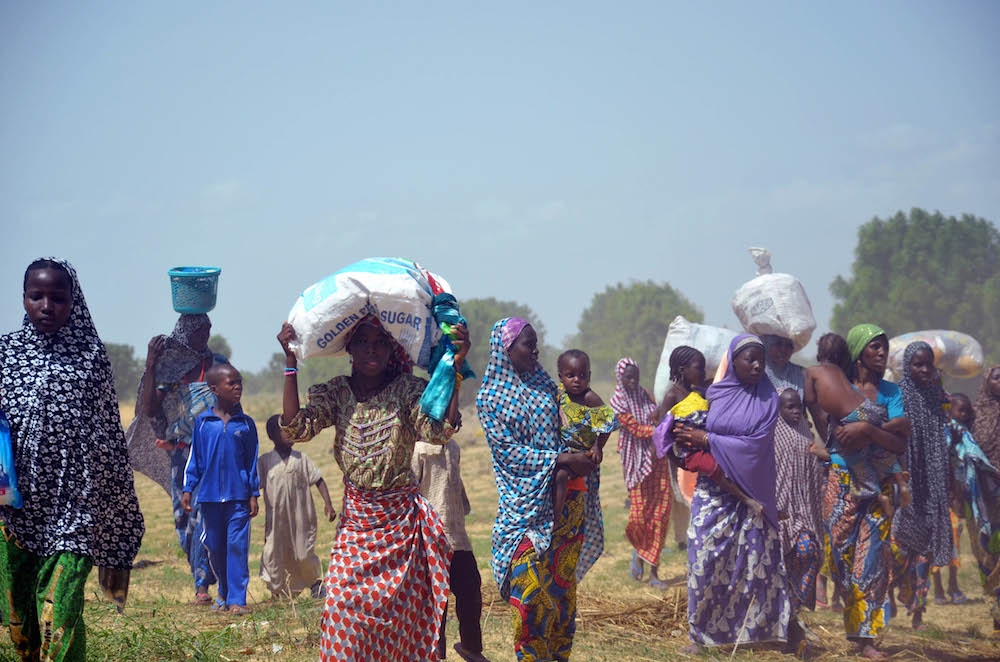Rachel Daniel
Amina married her husband when she was 11. He was a foot soldier in Boko Haram, the jihadist group whose seven-year campaign of abduction, sexual violence and killing has ravaged northeastern Nigeria. He appeared old to the young girl — perhaps even in his 30s.
“All he wanted to do was sleep with me,” says Amina, which is not her real name, as she tugs at the hem of her long skirt under her grey hijab.
In 2014 Boko Haram had captured her hometown, Banki, near the Cameroon border. Amina’s family fled to the nearby village of Walasa, but the militants invaded it as well. The girl was given a choice: marry the insurgent or her father would be killed.
“I felt no love for him,” she says softly. “It was my duty to marry him. I knew I found myself in a hopeless situation.”

Fati (right) was abducted by Boko Haram and then rescued by Cameroon soldiers. The 15-year-old was sent to Minawao refugee camp and later reunited with her mother. (K Prinsloo/UNICEF)
State-sponsored safe houses shelter the returned
Amina, now 13, is sitting on a mat in the dusty courtyard of a compound in Maiduguri, the capital of Borno state where Boko Haram launched its drive to create a regional Islamic caliphate in 2009.
There are other women and girls here — 60 or so. Snippets of hushed conversation settle comfortably in the afternoon air. Two girls are plaiting a friend’s hair, singing off-key. Like Amina, they were all once married to Boko Haram soldiers or commanders. In the shade of a cluster of neem trees, children are playing.
This is a safe house set up by the state governor for the women and children of the jihadists who have been rounded up by the Nigerian military as they reclaimed territories held by Boko Haram about eight months ago.
Razor wire snakes around the high walls of the compound, a cluster of bungalows. Nigerian superstar Wizkid is on repeat on a soldier’s radio. There is a heavy presence of soldiers and members of the local vigilante group, armed with AK-47s despite being innocuously named the Civilian Joint Task Force.
Officials insist this is not a prison and that the security measures are to protect the Boko Haram wives and children from irate locals — and rescue attempts by their husbands.
The road to ‘deradicalisation’?
The women are on a state rehabilitation programme that is aimed at “deradicalising” them. Here a young imam teaches them moderate Islam as an alternative to the message they got from their husbands and Boko Haram preachers.
They undergo blood and pregnancy tests and wear colourful hijabs and abayas. Some are learning to speak English and they are well fed.
Eventually, they will have to go back to their families and communities who are deeply suspicious of anyone who has had close contact with the insurgents: locals believe the girls and women abducted by Boko Haram have been bewitched and become sympathetic to their cause.
“[In reality] they were misled and brainwashed,” says Reuben Ibaishwa, the sole consultant psychologist working with the women in this safe house. He is with a local nonprofit organisation, the Neem Foundation, which provides psychosocial care to the women. Practically, this amounts to counselling sessions, taken in turns with state social workers. Ibaishwa wants to get the women to talk and open up, but says some are aggressive and refuse to co-operate.
“Due to what they saw in the Boko Haram camps, they have nightmares, anxiety, fear and other symptoms of post-traumatic stress disorder. We tell them that there are no right or wrong answers and to just tell us how they are feeling,” he explains.
Trust is hard won for both sides
A range of psychosocial interventions are aimed at helping the women reintegrate into society, says Fatima Akilu, executive director of the Neem Foundation. This includes risk assessment and management as well as profiling (recording and analysing a person’s psychological and behavioural characteristics to assess or predict their capabilities).
“We need to engage with them on all the reasons they were radicalised. For some, Boko Haram created a sense of belonging. For others, the fighters were attractive as they had money and power. For the first time, women had choices. They could become powerful as they were allowed to use weapons and become combatants in Boko Haram,” explains Akilu, who founded the government’s deradicalisation programme.
Even women who willingly joined Boko Haram experienced extreme violence. The ones who were kidnapped, held against their will and raped were deeply traumatised.
But it is difficult to win their trust — and social workers admit they in turn distrust and fear the women and girls. Boko Haram increasingly used women and girls to carry out suicide bombings. There was a tenfold increase (from four to 44) in the number of children involved in suicide attacks from 2014 to 2015, according to the United Nations International Children’s Emergency Fund (Unicef). In December two women reportedly killed about 45 people in nearby Adamawa state when they detonated bombs in a busy market. Three girl suicide bombers were killed when they tried to attack another market in January. In another incident earlier this year, two women carrying babies detonated bombs at a checkpoint.

In 2014, almost 300 schoolgirls from the village of Chibok were kidnapped by Boko Haram soldiers. Some girls, such as these, later escaped. (AFP)
War is waged on women’s bodies
Women have borne the brunt of Boko Haram’s rise and insurgency, a December 2016 report by the International Crisis Group said. Boko Haram started kidnapping women and children in 2013 and it soon became a core tactic. Figures stating that Boko Haram had taken more than 2 000 girls in 2014 alone are a mere estimation, the report found. It states: they “probably controlled a few hundred thousand women at the height of its insurgency”.
Like Amina, many girls and women were forced into marriage or sexual slavery. They would be abducted and taken to Boko Haram camps, where they would be indoctrinated and trained to fight, according to a 2015 Amnesty International report. The women would often be made to attack their own villages and families.
Amina doesn’t want to talk about what she saw but says her fighter husband, who already had a first wife, treated her “like dirt”.
“He never gave me anything I needed. His mother would give me soap … but he would even fight me over that.”
Amina quarrelled constantly with her husband’s older wife, who sent the girl to go back to her parents after a few months. Her father married the teenager, then 12, off to his apprentice to prevent her being forced into another marriage with an insurgent.
‘I was already in love with him’
But some women here married Boko Harm soldiers willingly.
At 25, Aisha is stylish and educated — she was an accounting student when she was forced to flee her hometown of Bama in 2013. Aisha fell in love with a Boko Haram commander, an Amir, when he helped her group to safety.
“He was very handsome, not so tall, dark and had a pointed nose,” she says, blushing. “Whether he was a Boko Haram commander or an armed robber, I was already in love with him and I married him when he asked me to.”
Refusing to leave the Amir’s side, Aisha moved with him to the erstwhile Boko Haram stronghold in the Sambisa Forest, a swathe of open woodland and some dense vegetation about 2m high. It’s the size of Belgium and believed to be home to Abubakar Shekau, supreme leader of the movement.
She had a good life there, says Aisha, who calls herself Amira. “I miss him so much. He used to buy me nice things.”
Many women joined Boko Haram voluntarily, the International Crisis Group report states, some for security, others for large dowries for their families. Several come from poor backgrounds exacerbated by the ongoing conflict. In certain cases, the women simply share the ideology.
Aisha claims not to know where her husband is or to have heard from him since being “rescued” by the Nigerian military. But she dreams that he’ll come and fetch her and their one-year-old son who lives with her at the safe house.

Communities who have been displaced by the conflict are wary of accepting former Boko Haram wives – and their children – back. (AFP)
‘Bad blood’ leaves a mark on women, children
Social workers admit that it will not be easy for women like Aisha to be accepted by the community. In an area that has been laid to waste and is gripped by severe hunger, there is deep resentment regarding the relative comfort the Boko Haram wives and children are being kept in.
But all women and girls who have experienced sexual violence during the conflict face stigmatisation, according to a 2016 Unicef and International Alert report.
The stigma and potential rejection is worse when someone abducted lived in an insurgent stronghold or was a wife of a combatant, the report found. Children conceived are said to be “of bad blood”, carrying the violent characteristics of their biological fathers.
It takes a long time before the women and children can return to their lives, Ibaishwa says.
“It’s a gradual process. For the women, the therapy stage is over. They are no longer hostile to us and talk about their feelings. Some are even willing to go back to school.”
In what the care workers here consider to be a major breakthrough, some families — including Aisha’s — have come to visit.
“My parents were here just the other day,” she says, smiling as her baby slides off her lap and toddles off.
- The safe house closed recently after the 64 women and children were reunited with their families and given resettlement allowances to start their own businesses. Other similar programmes are believed to be running. — Additional reporting by Adri Kotze